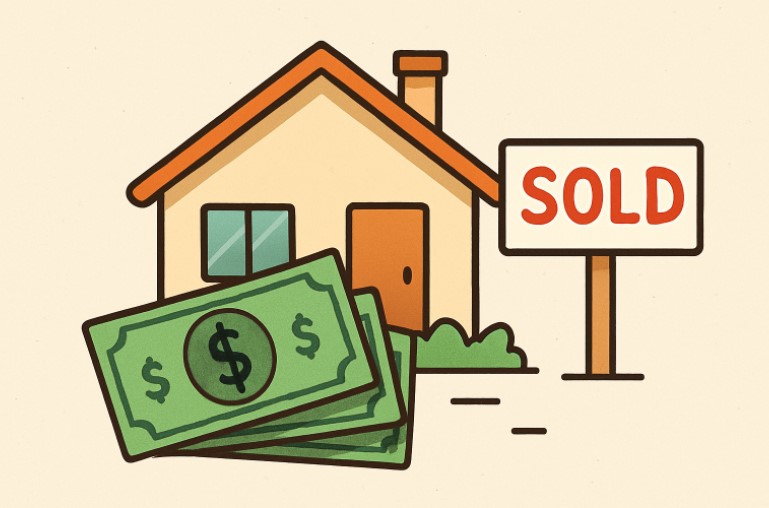Key Takeaways
- Selling your house for cash can expedite the closing process, often within days.
- Cash sales may allow you to sell your home “as-is,” eliminating the need for repairs.
- While convenient, cash offers might be lower than those from traditional buyers.
- It’s crucial to verify the legitimacy of cash buyers to avoid potential scams.
Thinking about selling your home but dreading the drawn-out process of repairs, showings, and lengthy negotiations? Many homeowners are opting for cash sales as a quick and efficient way to move on to their next chapter. The ability to sell your house fast for cash is just one reason this option stands out for people looking for convenience and certainty, especially when they want to sell fast without the usual delays.
Unlike traditional real estate transactions, selling for cash eliminates the waiting periods linked with loan approvals and inspections. Instead of navigating numerous hurdles, homeowners often receive a reasonable offer within days, and some companies allow you to skip costly repairs altogether by buying homes “as-is.” This approach allows you to move ahead on your timeline, proving especially useful if you’re relocating, handling an inheritance, or facing a financial crisis.
It’s essential to understand every step of the process if you’re considering a cash sale. This article outlines how selling your house for cash works, its advantages, common drawbacks, and how to verify buyers, enabling you to make a confident and informed decision.
Understanding Cash Offers
A cash offer is when a buyer has the funds available to purchase your home outright, removing the need for third-party mortgage lending. This means the offer is not contingent upon the buyer obtaining financing, resulting in a simpler and accelerated closing process. Cash buyers tend to purchase properties at or below market value to offset the benefits and speed they provide, making this an attractive solution for homeowners looking to close fast and move on with their following plans.
For sellers facing time-sensitive situations, this can be a practical way to avoid prolonged negotiations and uncertain financing approvals. It also provides peace of mind knowing the sale is less likely to fall through at the last minute.
The Process of Selling for Cash
- Initial Contact: The process typically begins when you reach out to a cash buyer—whether an investor or a company—expressing your interest in selling.
- Property Evaluation: The buyer then evaluates your home’s condition, often in person or through provided pictures, to determine its value. Your home’s as-is condition is usually acceptable, which means you won’t need to perform expensive upgrades or repairs.
- Offer Presentation: Following the evaluation, the buyer presents a cash offer. In most cases, you receive this offer within 24 to 48 hours.
- Acceptance and Closing: If the offer meets your approval, you can accept and proceed directly to closing. With minimal paperwork and no financing contingencies, transactions often settle in as little as a week.
Advantages of Selling for Cash
- Speed: The overarching benefit is the speed at which you can complete the sale. Cash sales can close rapidly since there are fewer steps involved, allowing homeowners to move forward quickly.
- Convenience: Most cash buyers don’t require you to make costly repairs or clean up the property. You can sell in “as-is” condition, saving time and frustration.
- Certainty: Because there are no lenders or appraisals to worry about, cash sales are less likely to fall through after an offer is accepted.
Potential Drawbacks
- Lower Offers: Buyers offering cash often present amounts below the home’s typical market value. This compensates them for the convenience and risk they assume by closing quickly and purchasing as-is.
- Scams: The industry has seen an influx of illegitimate operators. Safeguarding yourself means ensuring you’re dealing with established, reputable buyers who have a solid track record.
Verifying Cash Buyers
Protecting yourself during the process is crucial. A credible cash buyer should provide proof of funds—a legitimate bank statement or letter from a financial institution verifying they have the necessary cash available. Beyond financial proof, look for online reviews, testimonials, and ratings with organizations like the Better Business Bureau.
Consulting with a real estate professional or an attorney before finalizing any agreement can provide added peace of mind, especially in reviewing contracts and avoiding potential pitfalls.
Is Selling for Cash Right for You?
Assess your unique situation and selling priorities. If speed, simplicity, or avoiding home repairs is essential to you, selling for cash is a practical choice. As explained in Bankrate’s guide to cash offers, this option is especially beneficial if you’re facing financial hardship, need to relocate quickly, or simply want to avoid the lengthy delays common in traditional home sales.
If your main goal is to secure the highest possible sale price, you might be better served by exploring conventional sale methods, which can attract offers closer to or above market value. Each approach has clear pros and cons—by weighing them and thoroughly vetting buyers, you’ll be better prepared to choose the option that aligns with your goals and circumstances.
In summary, selling your house for cash provides a streamlined, straightforward process that prioritizes speed, convenience, and certainty. Understanding each step, knowing the advantages and risks, and conducting thorough due diligence ensures that you can make a confident and informed decision that best supports your financial and personal objectives.







